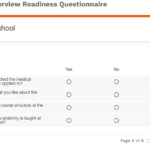The questions you answered have been analysed and a report on your readiness for the Medical School Interview has been produced with suggestions for improvement using activities modelled on high performing medical students of previous years.
Submitted on 2024-06-21 23:46:59 by passyourinterview@medicalschoolinterview.com
Click on the section headings below to view the report details:
Background and Motivation (Section Score: 50%)
It's great that you've spent some time on understanding your personal motivations to become a doctor but you need to be able to articulate these reasons confidently to another person. Furthermore you should make sure you've observed real doctors (possibly on YouTube) and what a normal day in their life looks like. Understanding the challenges of the path you're looking to take will avoid any surprises and prepare you for the road ahead. Medicine is more than just passing exams, its about life long learning and constantly trying to improve. It is absolutely essential you have short term and long term goals regarding the role you want to take, and be aware that these may change as you experience many different specialties during your clinical placements.
Personal Statement (Section Score: 37.5%)
Rereading your personal statement regularly with attention and practice is key to ensuring you have the information at the forefront of your mind. The details of your personal statement and circumstances you've described are perfect scenarios which can prove to be useful in an interivew. Work experience, volunteering, and what you do in your spare time are activities which can have a lot of cross over into medicine so during the interview you may have a station which focuses purely on this. Typical questions are about working in a team, identifying your strengths and weaknessee, experiencing failure, and managing conflict so make sure you've done your homework and can bring some personal experiences into the conversation. Your answers in this section show that you have a way to go but are on the right track, its now time to take it to the next level if you hope to have a running chance.
Medical School (Section Score: 25%)
Havng some knowledge of the medical school is good but you need to have thoroughly research the course, the campus, the facilities, extracurricular activities, and even the city in which the medical school is based. This shows enthusiasm and passion. You need to have a good grasp of the course structure and should have compared it with other medical schools and be able to higlight its postive elements. Anatomy is another area which is studied differently in different medical schools so bringing this up will certainly provide the interviewer with the evidence that you have done your research and are serious about joining them. Do more research, a superficial understanding is not enough.
Medical Ethics (Section Score: 16.67%)
You seem to have not spent enough time studying medical ethics especially the ethical standards from the official medical authority in your country (GMC in the UK). During your MMI you may need to recall and explain the ethical approach taken by the medical authority in your country. In the UK for instance there are four principles of medical ethics which should be on the tip of any prospective medical student. Knowing whats going on in the news will also help especially if you know of high profile situations where an ethical choice has to be made. The MMI is rarely going to ask a direct recall question, rather it will require you to explore the question, which will be set in a particular context, and come to an ethical solution. The GMC guidelines in the UK require every doctor to align to their code of conduct especially since the GMC is provide licensing to doctors to practice. Keeping aware of new technogies (e.g., AI, Robotics etc..) is definitely something you can talk about especially the ethical implications they present. Being a doctor requires life long learning so you should always be keeping up with new medical research.
MMI Interviews (Section Score: 50%)
Superficial knowledge of the MMI interview particularly in the medical schools you are applying to will not be enough. You need to prepare and practice and the only way to do that is if you conduct research to find out about the types of stations and the individuals who will be interviewing you if possible. You should have a thorough understanding of the skills required to be a doctor since you certainly won't be able to showcase examples of using these skills in your own life if you don't know what they are. Each medical school focuses on different attributes of a doctor so you need to have this in the forefront of your mind. Practice is essential but not the only thing - you need quality feedback and you'll only get this if you practice with a doctor or a HR professional. Friends and family can help you get over your nerves but their feedback will be subjective.






